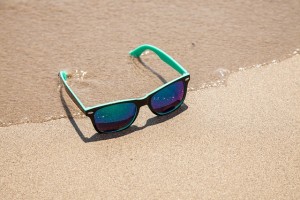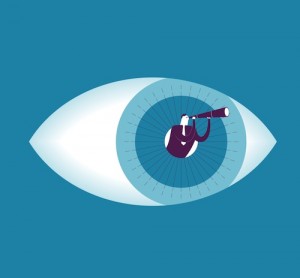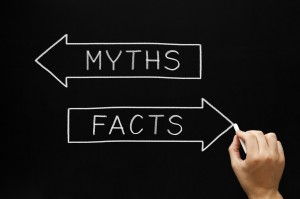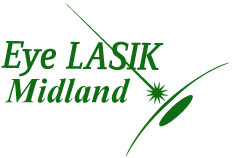
by EyeLASIK | Jul 20, 2015 | eye health
Summer is here, and you’re probably enjoying some fun in the sun! While catching some rays can be a good thing, if you don’t protect your eyes, it can turn into a bad thing; a bad thing that could have some serious consequences on your vision. If you are exposed to the UV rays from the sun for long periods of time without any eye protection, you are putting yourself at risk for a number of preventable eye diseases.
Some of these include:
- Cataracts
- Skin cancer of the eye lids and surrounding areas
- Melanoma of the eye itself
- Macular degeneration
Whenever you are out in the sunlight, it is important to wear sunglasses – but not just any sunglasses. Too often, we shop for sunglasses based on how we look in them. However, there are a few things you need to look for in a pair of sunglasses other than how you look when you wear them.

How do you choose sunglasses for vision protection?
Choosing Sunglasses
The most important thing to remember when choosing a pair of sunglasses for vision protection is that darker lenses are not necessarily better. The lenses need to absorb UV rays. A pair of dark sunglasses that do not absorb any UV rays can actually be more dangerous. The darker the lenses, the more your eyes dilate, meaning more UV rays are able to enter your eye.
Make sure the sunglasses you choose say they protect your eyes from both UVA and UVB rays. The label should say 99 to 100 percent UV absorbent or UV 400.
Next week, we will be discussing other factors to consider when choosing a pair of sunglasses for vision protection. So stay tuned! In the meantime, explore the rest of our blog section for more healthy vision tips & tricks. If you are considering LASIK and interested in learning more, request a FREE consultation here!

by EyeLASIK | Jun 29, 2015 | eye health, Eye LASIK
Summer is here and Fourth of July is this weekend! Both are a cause for sunny celebration. We’re sure you’ve heard how bad the sun can be for your eyes, but that doesn’t mean you have to hide in the shade! Take a look at these tips to enjoy the rays, but prevent eye damage!
Too much exposure to ultraviolet light can cause eye diseases like cataracts, growths (pterygium), and even cancer. Some of these diseases can take many years to develop, but every time you go outside with unprotected eyes, you are adding to this damage. No matter your age, you should always take precautions when going outside.
Protect Against The Sun
Find a pair of UV-blocking sunglasses (regular or polarized? Find out here!) and wear them all throughout the year, not just in the summertime! Clouds can be misleading, as the sun’s rays easily pass through haze and thin clouds. So don’t just think because it’s cloudy, your eyes can’t be damaged. The best sunglasses offer 100% UV absorption, are of the best optical quality, and are impact resistant.

Learn how to enjoy the summer rays but prevent eye damage!
In addition to sunglasses, consider purchasing a wide-brimmed hat (3 inches or larger) to not only protect your eyes, but also your neck, ears, and scalp. If you wear contacts, check to see if they protect against UV light. If they don’t, it is especially necessary to wear 100% UV protection sunglasses. This last tip may sound silly, but it’s important! Never look directly at the sun. That temporary blindness you experience afterwards slowly leads to eye damage. In fact, avoid looking up at the sky as much as you can, especially if you aren’t wearing a hat or sunglasses.
Preventing eye damage is as simple as this: Going outside? Grab your hat and shades!
At Eye LASIK Midland, we strive to provide you with information to not only protect your eyes, but to make them better! To learn more about LASIK and the procedures we offer, take a look at our blog section. And when you’re ready to get started, request a free consultation. We are ready to get you on the path to clear, healthy, vision!
Happy Fourth of July!

by EyeLASIK | Jan 29, 2015 | better vision, eye health
A low-fat nutritious diet is great for a variety of reasons, including eye health. Did you know snacking on healthy foods can help decrease a chance for common eye diseases and boost overall eye health? It’s true! Find out which nutritious snacks are the best for eye health!
Colorful Fruits
You know fruits are good for you, but choose the ones with the most color to receive the antioxidant benefits including Vitamins A, C and E. Try snacking on fruits like strawberries, blueberries, and oranges. All of which can be easily packed and snacked on throughout the day!
Deep Green Veggies
Vegetables, (especially the leafy, dark green ones!) can supply antioxidants such as Vitamin C and D. Broccoli, bell peppers and garden peas make an excellent snack choice to supplement eye health. Instead of using a dull romaine lettuce in your salad, try incorporating greens such as turnip, collard, mustard and kale for an extra nutrition boost!
Nuts & Eggs

These healthy snacks are great for eye health, too!
Brazil nuts, almonds and cashews provide minerals and Vitamin E, another vitamin that has been shown to slow Macular Degeneration. Additionally, the yolk in an egg does not only provide protein and Zinc, but can help reduce risk for Macular Degeneration and cataracts. Try boiling one in the morning and snacking on it with a small handful of nuts in the afternoon!
There you have it, just a few snacks to boost not only your general health, but eye health too! But don’t just keep these eye health snacks to yourself, share them with your friends and family. Because everyone deserves clear, healthy vision! If you enjoy these eye health tips, there’s more where that came from. Subscribe to our newsletter! Or, take a look at our other blogs on eye health. We’re here to help!

by EyeLASIK | Nov 5, 2014 | better vision, eye health
Be Proactive!
It’s easy to overlook eye care when you’re seeing well and have no irritation. However, even then, it is important to take care of your eyes! Oftentimes, when you wait until you notice a problem, it may be too late. Take a look at these easy ways to be proactive about your eye health!

Be proactive about your eye health!
- Visit your eye doctor-Get regular exams and make sure your eye doctor knows your accurate health history. Adults should have yearly eye exams and children should first see the eye doctor between the ages of 6 and 12 months. It’s important to detect visual problems early to avoid learning problems down the road.
- Replace Contact Case-If you wear contacts, be sure to replace your contact lens case every two to three months. This is a primary reason for complications. Often, contact cases are kept in humid bathrooms, which is a breeding ground for bacteria. Replace your case often and keep it in a clean , dry place. Take caution to entirely empty the case of all solution and thoroughly rinse and dry the case before putting it away.
- Caffeine Intake-Good news, two servings of caffeine a day can protect against dry eyes. However, more than 2 servings can deplete your tear film and dry out your eyes, leading to irritation. So, consume caffeine, but not too much!
- 20-20-20-Most people work in front of a computer all day. It is important to give your eyes a break! Remember the 20-20-20 rule. Every 20 minutes, look 20 feet away for at least 20 seconds. This breaks the eyes’ constant strain and helps refresh eyes by increased blinking. When using a computer, try to stay an arm’s distance away to avoid eye strain and dry eyes.
- Eat Your Veggies-Eating healthy foods isn’t JUST good for your health, it’s good for your eyes too! Don’t discount the power of fruits and veggies in regards to eye health. Dark leafy greens are rich in lutein, which protects against macular degeneration. Foods rich in omega-3s, such as fish and walnuts have been known to reduce inflammation in the blood vessels of the eye.
Taking Care Of Your Eyes Is Important!
Use these 5 tips daily to maintain and improve eye health and always remember the importance of taking care of your eyes. Are you interested in LASIK surgery for clear, crisp vision? Request a free consultation HERE and see if it’s right for you! You can also subscribe to our newsletter and receive all the latest news and promotions from Eye LASIK Midland!

by EyeLASIK | Oct 23, 2014 | eye health
Mystery Myths…
There are so many wives’ tales about your eyes! From eating carrots to sitting too close to a TV screen, how do you know which ones to believe? Let’s bust some eye myths and establish the best ways to protect vision and maintain eye health.
Don’t cross your eyes! They’ll get stuck!
Myth! Contrary to popular belief, your eyes will not stay crossed if cross them. If you notice your child is crossing one eye constantly, schedule an appointment with their eye doctor.
Eating carrots can improve vision.
Myth…kind of. Carrots are rich in Vitamin A, which IS essential to sight, but not necessarily the only food that benefits eye health. A well-balanced diet, full of fruits and vegetables, can provide the Vitamin A necessary for good vision.

Eye Myths Debunked!
Screen use damages eyes.
Myth! According to the American Academy of Ophthalmology, screen use won’t harm the eyes. However, using a computer for long periods of time can lead to eyestrain (eyes blink less than normal when looking at a screen and can dry out). Take a break every half hour or so to rest your eyes and moisturize them.
The eye is full size at birth.
Myth! Eyes continue to grow as your body grows. This growth accounts for refractive (glasses) changes that occur during childhood.
Only males can be color-blind.
Myth! While males do have more color-blindness than females (8% of males, less than 1% females), both males and females can be color-blind.
Poor eyesight is genetic.
Ehhh, this one is sometimes true. If your parents require glasses, or if they have an eye condition, they may pass the trait down to you.
Two blue-eyed parents can’t have a child with brown eyes.
Myth! Two blue-eyed parents CAN have a child with brown eyes, even though it is very rare. Likewise, two brown-eyed parents CAN have a child with blue eyes.
Debunked!
There you have it! Eye myths debunked! Now you have a better idea of how to protect and maintain good vision. If you’re interested in more information on obtaining better vision, you may be an excellent candidate for LASIK surgery. You can request a free consultation HERE! If you would like more eye health tips & tricks, subscribe to our newsletter and be entered to win a pair of Tory Burch sunglasses!

by EyeLASIK | Oct 8, 2014 | better vision, eye health
Can You Prevent The Decline Of Vision?
With aging bodies, come aging eyes. What can you do to prevent the decline of vision? Surprisingly, proper eye care for people over 50 (screening, diagnosis and treatment) can help to delay and even prevent vision decline.
Over half of baby boomers will develop an age-related eye disease. However, a recent study suggests more people are interested losing extra weight or eliminating back pain. Unfortunately, people don’t realize what’s at stake when it comes to their vision, assuming vision decline is something that is inevitable and expected. It doesn’t have to be! Appropriate Eye care for people over 50 can prevent the “inevitable” affects aging has on the eye.
Of course, aging and the affect it has on eyes is dependent on various factors (lifestyle, exposure, genetics). However, there are things you can do to reduce this affect.
Reduce The Effects Of Aging
- First, listen to your body. If something seems wrong or if you begin to question your vision, talk to a doctor. Always follow your instinct if something seems amiss.
- Have a baseline eye exam at age 40 to assess your eye health and receive personalized eye care tips, based on family history and lifestyle. After that, you should visit your eye doctor for a check up at least once a year, perhaps more often if recommended by your doctor.
- If you have diabetes, high blood pressure, or a family history of eye diseases, you should visit your eye care provider more regularly. There are probably drops or other medication you should be taking. Be sure to remain consistent and diligent with these medications, to treat and prevent any eye diseases that would lead to vision decline.
- Always wear some type of eye protection when going outside. Wearing special UV protection sunglasses and contacts protect the eyes more directly by blocking the effects of damaging rays, while a hat can help to shade your eyes. Avoid sun exposure between the hours of 10 am and 2 pm, as those are the most dangerous.
- There are so many links to good eye health and proper nutrition. Make healthy choices, with a diet hight in antioxidants from fruits and vegetables, to prevent the decline of vision. Ask your doctor which eye care supplement may be right for you. There may be a specific vitamin to promote eye care for people over 50, which should sometimes be recommended on a individual basis.
We’re Here To Help!
Eye care for people over 50 does not have to hard, if done the right way, and can make all the difference. Use these tips today and begin preventing vision decline! If you would like more eye health information, take a look at the rest of our blogs. If you have another question, please feel free to contact us HERE. We’re here to help!
Have you entered for a chance to win a pair of FREE Tory Burch sunglasses?! Just subscribe to our newsletter and enter into the drawing that will be held at the end of October!

Page 5 of 6« First«...23456»








